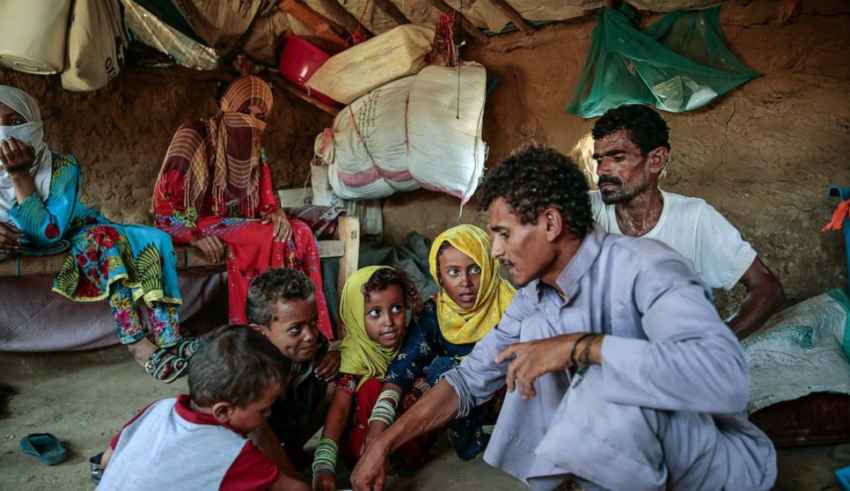
Millions of individuals around the world suffer from malnutrition. Most of them come from countries that are linked directly with conflicts, as conflicts affect the food availability and accessibility by having a great impact on agricultural production, mainly through the destruction of infrastructure. Besides that, conflict causes security malfunctions related to the access to the markets and thus, as a consequence, the prices of local foods are being increased.
Food insecurity may be the major factor of conflict outbreaks, among poverty, youth unemployment, grievances, inequalities in resources, poor governance and so on. The rising prices in food products, as well, can escalate conflict and political instability. The examples of such cases are numerous: food riots during the 1970s, 1980s and 1990s in Egypt, Jordan and Morocco, in 2007-2008 riots in 48 countries causing the resignation of Haiti’s Prime Minister and a coup against the President of Madagascar.
In Yemen, the rise in food prices in 2011 was a consequence of reduced domestic supply and imports. The inadequate physical infrastructure and the ongoing conflicts had a significant impact on the overall supply chain, a fact that worsened the rise in prices. The limited availability of fuel led to electricity and water shortages, and therefore the majority of sectors were unable to provide the fundamental goods and services, like health, education and social security. In 2015, initiated a huge humanitarian crisis with further impact on food distribution mechanisms, as the existing armed conflicts resulted in unemployment, loss of family income and food cost raise, due to transportation disruptions. The root of the food security issue is the decline of agricultural production, as more than 50% of Yemenis exclusively depend on this sector of the economy.
The impact of conflicts on food security can be significant and usually lead to health issues, especially when they are associated with children or infants. Specifically, in cases like the Rwandan genocide and Burundi during the war, the malnutrition overall affected the children’s growth, while in Afghanistan the required daily calorie intake was not sufficient, due to staple food price increases regarding the households.
Malnutrition has severe consequences in health, inducing mostly respiratory infections, such as pneumonia. In Yemen, pneumonia and diarrheal diseases are fatal to approximately 27% of children under the age of five.
Yemen is a country that has suffered on a great scale from economic crisis, intranational conflicts and numerous environmental disasters. COVID-19 was the icing on the cake, which can wipe out all the notable efforts in the country so far. Currently, the level of hunger is egregious with millions of people starving on a daily basis. The food insecurity of Yemen reaches 17.8 million people, along with the level of child and pregnant malnutrition, which is one of the highest in the world. This extremely fragile situation could face a dramatic escalation, if the external aid would be disrupted. It is obvious that despite the ongoing humanitarian assistance, the existing crisis is continuously growing.
Food security is a part of comprehensive steps that need to be applied for a stable society. Considering the fact that agriculture is the key sector of Yemeni economy, international aid should be focused on that, resolving the food transportation issue along with the introduction of income-generating projects, in order to improve the resilience of the population. Securing food is a vital progress and should be recognised as one.
References
- Akresh, R., Verwimp, P., & Bundervoet, T. (2011). Civil War, Crop Failure, and Child Stunting in Rwanda. Economic Development and Cultural Change, Vol.54(No.9), pp. 777-810. DOI: 10.1086/660003
- Brinkman, H.-J., & Hendrix, C. S. (2011, July). Food Insecurity and Violent Conflict: Causes, Consequences, and Addressing the Challenges. World Food Programme. https://documents.wfp.org/stellent/groups/public/documents/newsroom/wfp238358.pdf
- Bundervoet, T., Verwimp, P., & Akresh, R. (2009). Health and Civil War in Rural Burundi. Journal of Human Resources, Vol.44(No.2). http://jhr.uwpress.org/cgi/reprint/44/2/536
- Burki, T. K. (2012, August 18). Yemen’s hunger crisis. World Report, Vol. 380(No.9842), pp. 637-638. DOI: https://doi.org/10.1016/S0140-6736(12)61356-7
- Collier, P., & Hoeffler, A. (2004). Greed and Grievance in Civil War. Oxford Economic Papers, Vol.56(No.4), pp, 563-595. DOI:10.1093/oep/gpf064
- Deininger, K., & Castagnini, R. (2006). Incidence and impact of land conflict in Uganda. Journal of Economic Behavior & Organization, Vol.60(No.3), pp. 321-345. https://doi.org/10.1016/j.jebo.2004.04.008
- D’Souza, A., & Jolliffe, D. (2013, October). Conflict, Food Price Shocks, and Food Insecurity : The Experience of Afghan Households. Food Policy, Vol.42, pp. 32-47. http://hdl.handle.net/10986/16459
- Dureab, F., Al-Falahi, E., Ismail, O., Al-Marhali, L., Al Jawaldeh, A., Nahar Nuri, N., Safary, E., & Jahn, A. (2019). An Overview on Acute Malnutrition and Food Insecurity among Children during the Conflict in Yemen. Children, Vol.6(No.77), pp.1-8. https://doi.org/10.3390/children6060077
- Fearon, J. D. (2011). Governance and Civil War Onset. World Bank Group. http://hdl.handle.net/10986/9123
- Fink, M. D. (2017, August 08). Naval Blockade and the Humanitarian Crisis in Yemen. Netherlands International Law Review, Vol.64, pp. 291-307.
- Miguel, E., Satyanath, S., & Sergenti, E. (2004, August). Economic Shocks and Civil Conflict: An Instrumental Variables Approach. Journal of Political Economy, Vol.112(No.4), pp. 725-753. https://doi.org/10.1086/421174
- Rethinking Yemen’s Economy. (2017, June 05). Addressing Yemen’s Most Critical Challenges: Practical Short-Term Recommendations. https://sanaacenter.org/wp-content/uploads/2017/06/Rethinking-Yemen%e2%80%99s-Economy-policy-brief-1.pdf
- United Nations: World Food Programme (WFP). (n.d.). Yemen emergency. https://www.wfp.org/emergencies/yemen-emergency
- Walton, J., & Seddon, D. (1994). Free Markets & Food Riots: The Politics of Global Adjustment. Blackwell, International Journal of Urban and Regional Research. DOI:10.1002/9780470712962
- World Bank. (2012). Yemen Economic Monitoring Note, Fall 2012. World Bank Group Report. http://hdl.handle.net/10986/26775
- World Health Organization (WHO). (2015). Child and Adolescent Health-Yemen. http://www.emro.who.int/child-adolescent-health/data-statistics/yemen.html
By The European Institute for International Law and International Relations.













